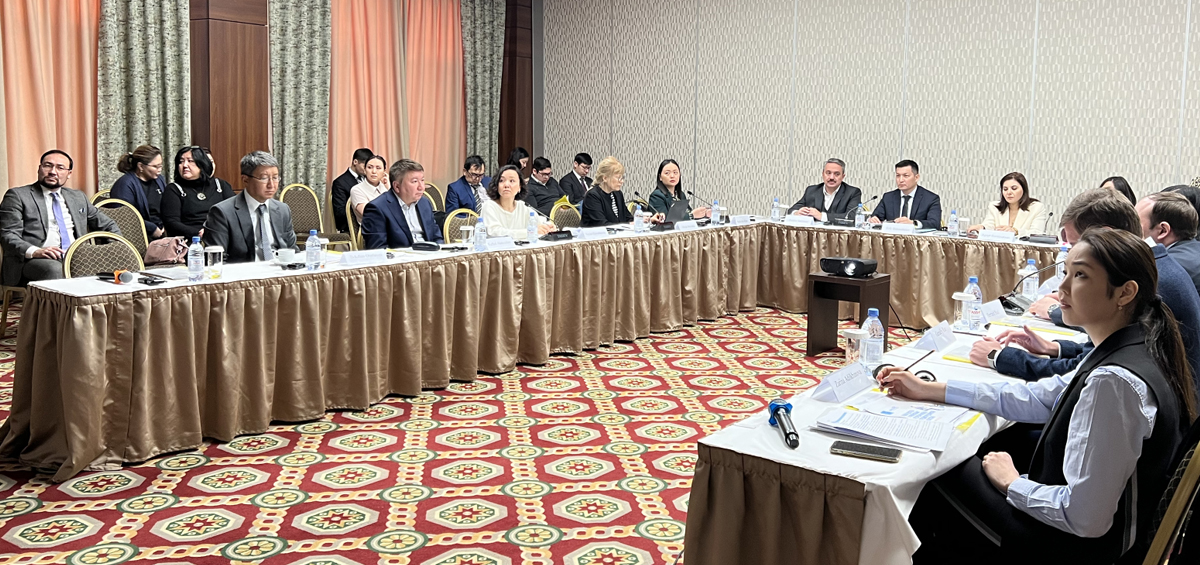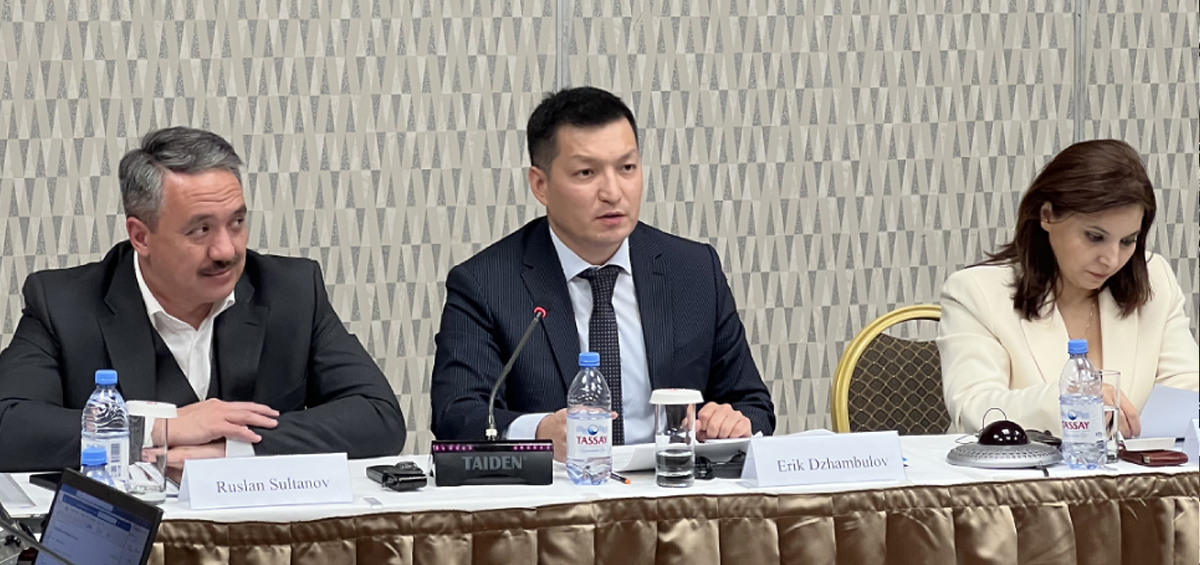ER.organized a workshop on improving the accessibility of SME finance
28.11.2022
The workshop was the final event of the ERI and United Nations Economic and Social Commission for Asia and the Pacific (ESCAP) project to assess SME financial inclusion in Kazakhstan.
The event was opened by Ruslan Sultanov, Chairman of the ERI Board and Alberto Isgut, Economic Affairs Officer, Macroeconomic Policy and Financing for Development Department, ESCAP. The moderators were Erik Djambulov, Director of the Business Development Policy Department of the Ministry of Economy, and Agapi Harutyunyan, Senior Economic Advisor of the Macroeconomic Policy and Financing for Development Department of ESCAP. Representatives of the Ministries of National Economy and Agriculture Nadezhda Chen and Shynar Nurgazina, as well as Damu Development Fund - Aliya Agybaeva and Agrarian Credit Corporation - Gerard Baal, informed the speakers about the status of state support to SME and agricultural sector. Ms. Maria Dotsenko of UN Women and Ms. Nazira Dzhakipbayeva, Head of Women Entrepreneurship Development Centres of Atameken NPO of the Republic of Kazakhstan spoke about the projects being implemented to increase access to financial resources for women, including those from rural areas.  Bakhytgul Khambar, Director of the ERI Sustainable Development Goals Secretariat, informed that Kazakhstan is at an early stage of implementation of the Integrated National Financing Framework and drew attention to the low proportion of budgeting for the SDGs: «According to the results of a rapid comprehensive assessment conducted by ERI in 2021, only 58.6% of the SDGs have a link to budget programmes (including budgets of rural districts)». In a discussion format, speakers and participants discussed the reasons holding back the development of quality entrepreneurship and investment in the real economy, both directly by entrepreneurs and by financial institutions, and ways to address them. «A situation where all 17 regions, home to three quarters of Kazakhstan's population, account for only 37% of all lending to the economy is a serious challenge to financial inclusion not only for SMEs but also for the economy as a whole» - concluded Nurgul Khaidarova. The Institute's study notes the lack of growth of medium-sized businesses, which account for less than 0.2% of all SMEs over the decades, the representation of almost 50% of all businesses in unproductive sectors (trade, other services), and the corresponding prevalence of designated sectors in the SME employment structure, especially among women. In 2021, 57.3% of women and 34% of men were employed in trade and other services.  The experts present at the seminar agreed as factors limiting the transition of the number of SMEs - at the end of 9 months. 1.6 million units registered in 9 months of 2022 - to quality, high interest rates, rigid collateral policy, unfairly equal conditions for SMEs and large enterprises, reduced competence of loan officers working with this category of clients. Zarina Adilkhanova, senior researcher at NAC Analytica's Centre for the Development of Economic Modelling, emphasised the excessive importance of trade credit (credit between firms in the form of deferred payment for goods) for Kazakhstani SMEs compared to the rest of the world). «About 90% of large enterprises and 70% of SMEs turn to trade credit, while bank loans, another important source of external finance, are only obtained by about 30% of large enterprises and 10% of SMEs. The reason for this anomaly can be partly explained by the limited availability of credit, especially for SMEs, high real interest rates and limited state funding to provide low-interest loans to SMEs» - оsaid Zarina Adilkhanova. Representatives of the banking sector and MFIs, in their turn, highlighted the problem with the lack of funding and the associated risks. Yerbol Abdugaliyev, Deputy Chairman of the Management Board of Bank RBK JSC: «In any balance sheet there is an active part and a passive part, therefore, if we talk about crediting, we should also think about funding. Funding for banks is customer deposits. As a living example. 75% of Bank RBK's loan portfolio is long-term investment projects, most of which are SME projects. It is with long-term financing that the problem arises. Depositors want to be able to withdraw their deposits at any time. If the base rate rises, clients close old deposits and open new ones. At the same time, the bank is already burdened by investment projects that were issued at the old rates, and at the same time the bank has a growing interest rate burden on the deposits». Yerbol Omarkhanov, Director of ALC Association of Microfinance Organizations of Kazakhstan: «The cost of microcredit is determined by the cost of funding. MCOs face the problem of lack of available funding sources within the country, the high cost of working capital». Speaking of challenges, speakers also highlighted positive trends: Aliya Miller, Director of the Strategy and Analysis Department of the Financial Market Regulation and Development Agency of Kazakhstan: «In 2022, the trend of growth in corporate lending, which emerged in 2021 after 4 years of negative trends, continued. Despite the new challenges, SME lending increased by 6.8% to 8.9 trillion tenge in the first 9 months of the year. The positive dynamics were also influenced by regulatory stimulus measures. For example, risk-weighting ratios were lowered from 75 to 50 percent for SME lending by 2024, and mitigating funding ratios of 0.8 with Basel standard of 1.0 were introduced to reduce pressure on banks' liquidity in short-term funding environment. To support businesses in a shortage of quality collateral, opportunities to use land plots and subsoil use rights as collateral have been expanded». Aliya Miller, however, stressed that all regulatory measures aimed at preserving the balance of financial stability and supporting the growth of quality lending are punctual and temporary. «Regulatory incentives alone are not enough. The sustainability of the corporate sector needs to be improved. We need to improve corporate governance, the quality of reporting, the effectiveness of corporate bankruptcy» – said the expert. Yerbol Omarkhanov: «At the initiative of the Association, amendments were made to the Law on Microfinance Activities, which now allows MFIs to issue bonds and raise financing on the stock market. Together with credit partnerships we are working on the issue of creating an address fund on the IFCA platform.» Gennady Rau, Chief Economist of the Asian Development Bank's (ADB) representative office: «ADB is actively working with MFIs. In particular, in June we signed an agreement with KMF, a major microfinance institution in Kazakhstan, for a loan worth 7 billion tenge ($15 million)». This is an important project for increasing financial inclusion in the country, as the clients of MFIs are primarily women, but also people from rural areas. Representatives of internationa.organisations and think tanks highlighted the problems of inefficient state support, also raised in the ERI report. Gennady Rau, chief economist at the Asian Development Bank's (ADB) representative office: «The first point. Shifting the risk from the BVU to the government. When Damu provides resources to the STBs, the STBs have to do their due diligence before lending. Many banks do not do this because subsidised resources or state guarantees allow them to lend more easily. Second. Even international financial institutions are negatively affected by subsidisation. There is almost a cannibalisation of private financial products. Even the small interest rate of ADB, for example, 12%, because of the subsidized loan rate of 6% is not attractive to Kazakhstani companies». The economist called for an analysis of current practices and a change in approaches to state support, taking into account the need to develop private finance. In the context of the analysis of state support, Zarina Adilkhanova pointed out problems of developing favouritism and the excessively low share of lending to the manufacturing sector with the participation of state support. Zhanibek Aigazin, Director General, AERC: «Increased state support is not good, unfortunately in the current environment of rising inflation and the base rate, this could happen. But this is in any case financial repression, cannibalism of banking products, we should not forget that. There are questions about the lack of co-ordination of state support, as ERI colleagues pointed out, as well as the lack of qualitative growth in entrepreneurship. In particular, low labour productivity, representation especially of small and micro-entrepreneurship in creation of non-tradable goods, designed for domestic market products, although the objective for small enterprises should be to enter foreign markets due to the size of the Kazakh market». Proposals have been made to consider creating a single portal for state support and a separate coordinating institution, the SME Development Corporation. In his turn, World Bank Chief Financial Sector Specialist Jambal Ganbaatar raised the theme of productivity and the environment and called on financial institutions to encourage SMEs to invest in green technologies: «One of the internal causes of Kazakhstan's economic slowdown has been a productivity slowdown. The difference in SME productivity between Kazakhstan and the rest of the world is 44%; Russia, for example, has half that difference. The productivity of companies could be boosted by smart green technology and digitalisation. According to the World Bank's survey, only 17% of Kazakhstani SMEs in the sample responded that they have a system for monitoring waste emissions. This is a very low figure. The average for Central Asia and Eastern Europe is 50%. To promote the sustainability of SMEs, the World Bank is developing an open tool for self-diagnostics of enterprises and prioritisation of carbon footprint reduction». Background: An Integrated National Financing Facility (INFF) is a planning tool aimed at developing a SDG-focused financing strategy. The INFF provides for the integration of sustainable development planning with government fiscal and financial policies, the integration of public and private financing into a holistic SDG financing strategy, and cooperation between partners through a monitoring and reporting system.
Views: 6178 |
|
||||||||||||||||||||||||||||||||||||||||||||||||||||||||||||||||||||||||||||||||||||||||||||||||||||||||||||||||||||||||||||||||






|